MercoPress. South Atlantic News Agency
Tag: Evo Morales
-
Saturday, June 5th 2021 - 08:21 UTC
Mexico blasts OAS Secretary General Almagro, “one of the worst in history”
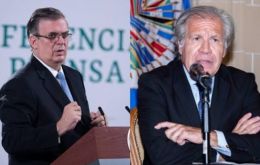
Mexico's foreign minister on Friday criticized the work of the head of the Organization of American States, Uruguayan born Luis Almagro, adding to its earlier rebuke that the group should not intervene in Bolivia's internal affairs.
-
Tuesday, May 4th 2021 - 09:10 UTC
Bolivia, Mexico agree to lift mutual visa requirement for short stays
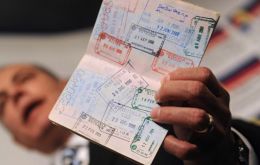
The governments of Bolivia and Mexico Monday announced they had agreed to lift the mutual visa requirement for citizens of either country wishing to travel to the other for stays of up to 180 days.
-
Tuesday, April 13th 2021 - 08:56 UTC
Major setback for Evo's party: none of its candidates win governors' elections in Bolivia

As the results of Sunday's departmental elections in Bolivia were becoming known Monday, former President Evo Morales' Movimiento al Socialismo (MAS) recorded one defeat after another.
-
Wednesday, March 17th 2021 - 09:09 UTC
Bolsonaro concerned with Bolivian ex-president Añez arrest and the overall situation

Brazilian President Jair Bolsonaro said on Tuesday that the arrest of former interim Bolivian President Jeanine Áñez over the weekend seemed unreasonable, adding he sees the situation in Bolivia as a cause for concern.
-
Monday, March 15th 2021 - 09:55 UTC
Arrest of former Bolivian interim president, escalates hostilities in the country

Bolivia's former interim President Jeanine Añez landed behind bars in La Paz after the new government arrested her on claims she participated in a 2019 coup to seize power. Supporters warned her arrest could lead to civil unrest in certain areas of Bolivia and argued there was no legality in the arrest and charges, but rather a political vendetta.
-
Saturday, March 13th 2021 - 09:52 UTC
Bolivian former interim president and cabinet members face charges of an alleged coup
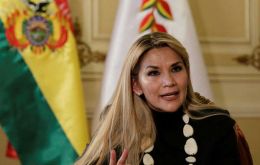
Former Bolivian interim president Jeanine Anez said on Friday that she and former Cabinet members faced arrest over an alleged coup. In a tweet, she said, “The political persecution has begun.” Prosecutors accused them of terrorism and sedition related to the ouster of long-time leader Evo Morales.
-
Thursday, November 12th 2020 - 09:50 UTC
Argentine president and several ministers under preventive isolation after an official tested Covid-19 positive
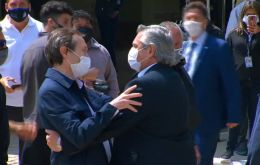
The president of Argentina, Alberto Fernández, and several of his ministers began preventative isolation after coming in close contact with an official infected with coronavirus, the government said in a statement late on Wednesday.
-
Monday, November 9th 2020 - 09:31 UTC
Bolivian president takes office promising to rebuild the country in unity and peace
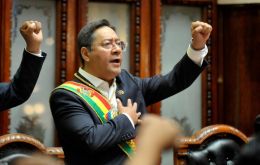
Luis Arce was sworn in as Bolivia’s new president on Sunday, bringing to a close a turbulent period characterized by political and social turmoil after former president Evo Morales left the government in November following a disputed election.
-
Saturday, November 7th 2020 - 08:55 UTC
Bolivia's miracle architect now faces the challenge of scarce funds and managing austerity

Luis Arce, a quiet economist who will be sworn in as Bolivia's president on Sunday after a landslide election win, knew where he stood in the political spectrum as a young teenager in La Paz, when he picked up the writings of philosopher Karl Marx.
-
Friday, November 6th 2020 - 08:58 UTC
Conservatives in Bolivia protest against the inauguration of president elect Arce
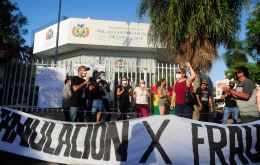
Conservative opponents of Bolivia's center-left president-elect Luis Arce have announced a two-day strike from Thursday protesting alleged electoral fraud. The strike is taking place across the eastern department of Santa Cruz, Bolivia's economic hub as well as home to its biggest city.
